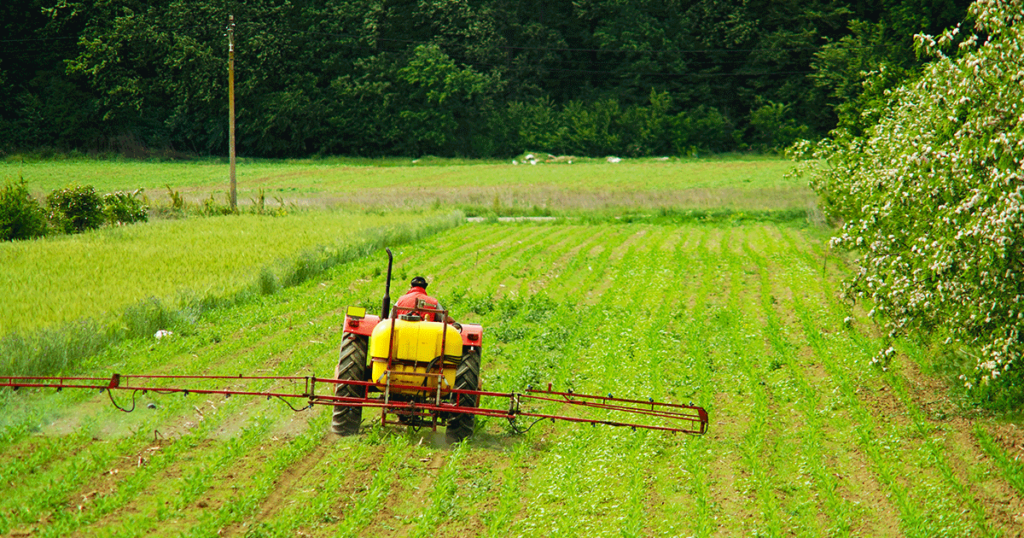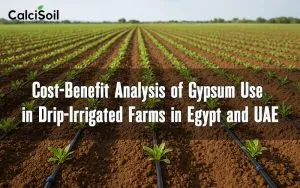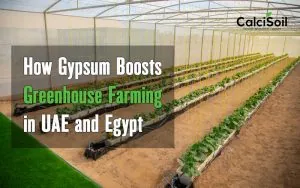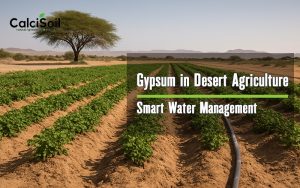
Gypsum benefits
And importance of its application
Gypsum is a naturally occurring mineral composed of calcium sulfate dihydrate, and it has been a crucial component in agriculture for centuries. Its historical use as a fertilizer dates back over 250 years, making it one of the first fertilizers employed by farmers worldwide. The significance of gypsum in modern agricultural practices cannot be overstated, as it offers a multitude of benefits that enhance soil health and crop productivity.
Importance of Gypsum in Agriculture
Nutrient Supply
Gypsum serves as an excellent source of two essential nutrients: calcium and sulfur. Calcium plays a vital role in plant structure, contributing to the stability of cell walls, while sulfur is crucial for protein synthesis and enzyme function. The moderate solubility of gypsum (approximately 2.5-2.6 g/L) allows it to gradually release these nutrients into the soil, ensuring that plants receive a steady supply without the risk of salinization that can occur with more soluble fertilizers. This characteristic makes gypsum particularly beneficial for maintaining optimal nutrient levels in the soil.
Soil Structure Improvement
One of the most significant advantages of gypsum is its ability to improve soil structure. It acts as a soil conditioner, enhancing soil tilth and breaking up compacted soils. This improvement leads to increased water infiltration and aeration, which are essential for healthy root development and overall plant growth. By fostering better soil structure, gypsum helps create an environment where plant roots can access water and nutrients more efficiently.
Mitigation of Soil Issues
Gypsum is particularly effective in addressing problematic soils, including sodic and acidic soils. In sodic soils, high sodium levels can lead to poor drainage and reduced crop yields. Gypsum helps mitigate these effects by displacing sodium ions, thereby improving soil permeability and reducing salinity. Additionally, in acidic soils, gypsum can help alleviate aluminum toxicity, which can hinder plant growth by affecting root development.
Erosion Control
In regions prone to erosion, gypsum plays a critical role in stabilizing soil and preventing nutrient runoff. By enhancing soil aggregation and stability, gypsum reduces the risk of erosion caused by wind or water, preserving valuable topsoil and maintaining nutrient levels within the soil. This is particularly important in agricultural settings where maintaining soil quality is essential for sustainable farming practices.
Enhanced Water Management
Gypsum also contributes to improved water management in agricultural fields. Its application increases the water-holding capacity of soils while promoting better drainage. This dual benefit is crucial during periods of drought or heavy rainfall, as it helps crops maintain moisture levels without becoming waterlogged. Improved water-use efficiency allows crops to thrive even under challenging environmental conditions.
Gypsum’s Role in Sustainable Agriculture
The application of gypsum aligns with sustainable agricultural practices by reducing the need for chemical fertilizers. Studies have shown that using gypsum can lead to significant savings on fertilizer costs while simultaneously improving soil health. By enhancing the natural fertility of the soil, gypsum supports long-term agricultural sustainability.
Application Techniques
To maximize its benefits, farmers should apply gypsum based on specific crop requirements and soil conditions. Conducting soil tests can help determine the appropriate rates for application. Gypsum can be evenly spread over fields or incorporated into irrigation systems for effective distribution.
Conclusion
In conclusion, gypsum is an invaluable resource in agriculture due to its multifaceted benefits ranging from nutrient supply to soil structure improvement and erosion control. Its historical significance as one of the first fertilizers used by farmers underscores its enduring importance in modern agricultural practices. As farmers continue to seek sustainable solutions for enhancing crop yields and maintaining soil health, gypsum remains a cornerstone of effective soil management strategies. By utilizing this natural mineral wisely, agricultural producers can ensure healthier crops and more productive farming operations for years to come.







